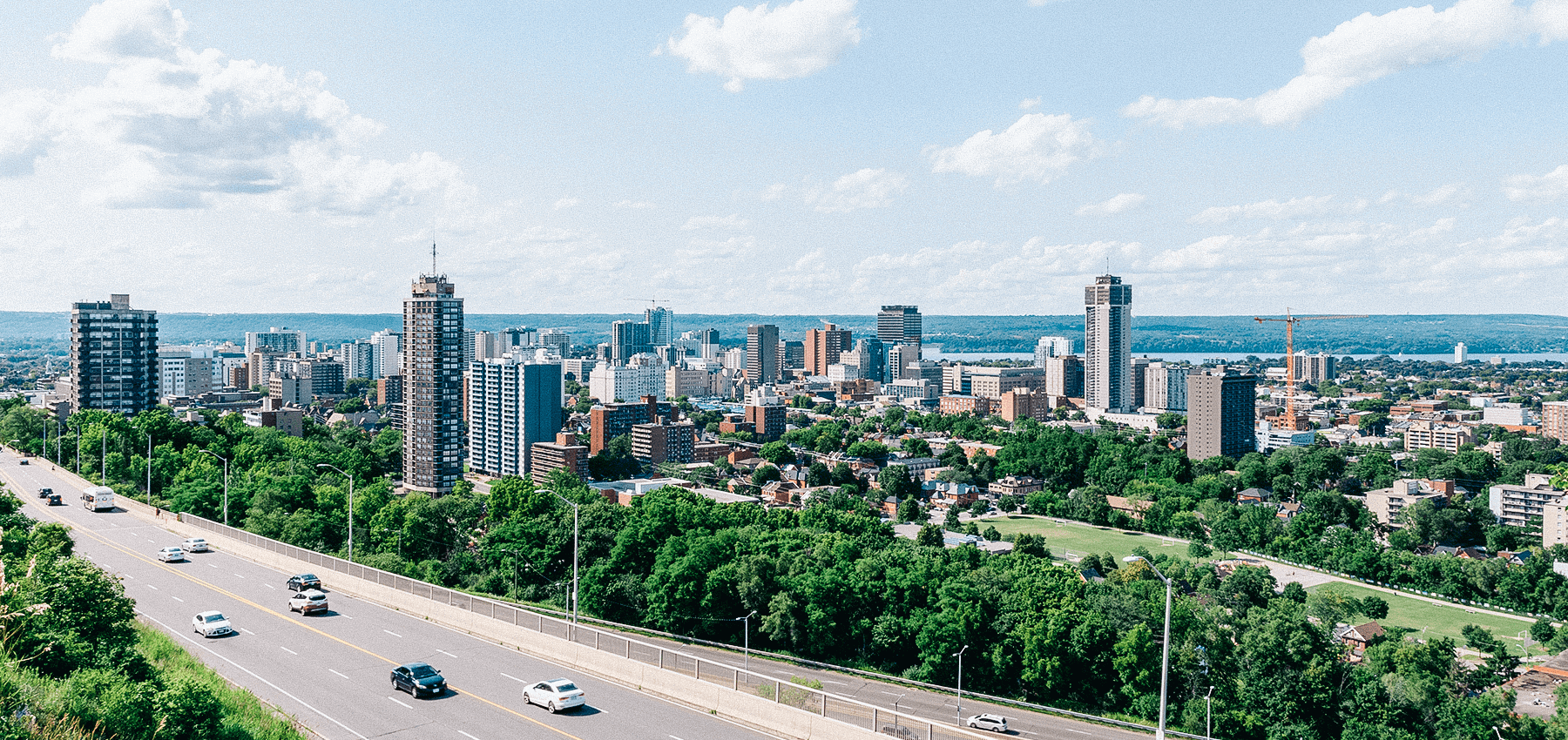As a newcomer moving to Canada, there are several factors you should consider before deciding which city to settle in. From the ease of finding a job in your industry to the cost of living and availability of amenities, your new home in Canada should offer everything you need to enjoy a good quality of life.
Many newcomers are attracted to major cities like Toronto or Vancouver, but smaller cities, like Hamilton, offer a similar quality of life at a lower cost of living. Hamilton is a culturally diverse city with a lucrative job market and its own vibrant downtown. Being within driving distance of downtown Toronto, it offers newcomers an ideal mix of urban and suburban living.
In this article, we cover various aspects of living in Hamilton as a newcomer, including the city’s weather, culture, job market, transportation system, and more.
In this article:
- About Hamilton, Ontario
- Weather in Hamilton
- Culture and languages in Hamilton
- Job market in Hamilton
- Renting accommodation in Hamilton, Ontario
- Transportation in Hamilton
- Education in Hamilton
- Health care in Hamilton
- Why live in Hamilton as a newcomer?
About Hamilton, Ontario
Hamilton is a port city located in Southern Ontario, on the western end of Lake Ontario. Situated approximately 68 kilometres southwest of Toronto, Hamilton is part of the Greater Toronto and Hamilton Area (GTHA).
Spread over an area of 1118.31 square kilometres, the City of Hamilton comprises the communities of Hamilton, Stoney Creek Glanbrook, Ancaster, Dundas, and Flamborough. According to the 2021 census, the city has a population of 569,355, which makes it the fifth-most populated city in Ontario and the tenth-largest in Canada.
In 2019, Hamilton was ranked as one of the 25 Best Communities in Canada by Maclean’s Magazine. The city’s proximity to Toronto, coupled with its relatively lower cost of living, makes Hamilton an attractive destination for newcomers to Canada. With many companies in Canada offering remote or hybrid work opportunities, newcomers are also finding it easier and more economical to live in nearby cities like Hamilton and commute to Toronto a couple of times a week for work.
Weather in Hamilton
Like most of Canada, Hamilton experiences all four seasons: summer, fall, winter, and spring. The weather in Hamilton is similar to that in Toronto. Winter in Hamilton lasts from November to late March. Due to the city’s proximity to the lake, winter can often be milder and damper than in other Canadian cities. Even then, winter months are cold and snowy and temperatures below -10°C are common. As a newcomer, you should also be prepared for a warm summer, with the average maximum temperature in July being 27°C.
Culture and languages in Hamilton
Hamilton is a multicultural city, with nearly a quarter of the city’s population identifying as visible minorities. Immigrants, old and new, make up 25.94 per cent of Hamilton’s population. Even in the early 20th century, immigrants from the United States, United Kingdom, Ireland, Italy, Hungary, and Austria were drawn to Hamilton’s growing industrial sector and settled here. Currently, the largest source countries for newcomers to Hamilton also include India, Philippines, Iraq, Portugal, Pakistan, China, Jamaica, and Ukraine.
You’ll find similar diversity in the languages spoken by people living in the city. After English, the most commonly spoken languages in Hamilton are Arabic, Italian, Spanish, Portuguese, Polish, Punjabi, Mandarin, Serbian, Urdu, Tagalog, Vietnamese, and Ukrainian.
Job market in Hamilton
As of late 2022, Hamilton’s unemployment rate is five per cent, which is lower than the provincial average. The city boasts of a strong job market, with abundant opportunities across its key industries such as steel, advanced manufacturing, science and education, food and beverage, transportation, construction and real estate, finance and insurance, healthcare and life sciences, ICT and digital media, tourism, and waste management.
The top employers in Hamilton include Airbus Helicopters Canada Ltd., FirstOntario Credit Union, Hamilton Health Sciences, Hamilton-Wentworth Catholic District School Board, McMaster University, City of Hamilton, Mohawk College, and ArcelorMittal.
Renting accommodation in Hamilton, Ontario
As a newcomer, you should ideally book temporary accommodation for your first few weeks in Canada before you arrive. This will give you time to explore the neighbourhoods in Hamilton before you find a home to rent long-term. If you’re interested in buying a home, a site like Houseful will help you browse homes for sale in Hamilton and the surrounding area.
There are several types of rental accommodation available in Hamilton, ranging from apartments, basement apartments, and condos to detached or semi-detached homes. On average, the monthly rent for a one-bedroom apartment is $1,683 (according to Realtor.ca, October 2022), whereas a two-bedroom apartment costs around $2,155 per month.
If you’re looking to rent a basement apartment, your rent may range between $1,350 and $1,850 depending on the number of bedrooms in the unit. Compared to Toronto, average rental prices in Hamilton are 30 to 35 per cent cheaper. Besides budget, your decision on the type of accommodation to rent will also depend on the size of your family, preference of neighbourhoods, how much space you need, and the amenities you’re looking for.
Renting a home as a newcomer can be tricky since many landlords require tenants to have a job offer or Canadian credit history. However, our article on how to rent a home with no job letter or credit history offers workarounds for newcomers who don’t have a Canadian job or credit history yet.
How much money do you need to live in Hamilton?
The cost of living in Hamilton will depend on the neighbourhood you reside in, your lifestyle, the size of your family, and whether you plan to use public transportation or drive. In most cases, it will be cheaper to live in Hamilton than in downtown Toronto, given that housing rents are significantly lower. You can use the Arrive cost of living in Canada calculator to get an estimate of your monthly expenses in Hamilton, including rent, transportation, and more.
Transportation in Hamilton
Most people in Hamilton use a car or public transportation to get around. Hamilton is connected to downtown Toronto by GO Transit; the journey takes 1 hour and 15 minutes. You can also use HSR buses to travel within the city. Both GO Transit and HSR buses accept Presto cards for fare payment.
Many neighbourhoods in the city have a low walk score (a score that tells you whether commonly used amenities, like grocery stores, are within walking distance), and as a result, most Hamilton residents prefer to have a car. You need a valid driver’s licence to drive in Ontario, and the province has a three-step licensing process, which includes a knowledge test and two road tests. As a newcomer, you may be able to drive in Ontario using your international licence for up to 90 days. By car, the trip from Hamilton to downtown Toronto takes around 1.5 hours.
Generally, children who don’t live close enough to their school to be able to walk there can take the free school bus service offered by the school board.
Education in Hamilton
Sending your child to school in Hamilton
Hamilton offers several different schooling options, including free public schools, free Catholic schools, as well as private schools that charge tuition fees. The public school system in the city is managed by the Hamilton-Wentworth District School Board (HWDSB) and includes 80 elementary schools and 13 secondary schools. The HWDSB caters to almost 50,000 children and has a dedicated Welcome Centre where newcomers can register their kids.
Students must be at least four years old by December 31 of the year for which they are registering for Kindergarten. Elementary schools typically enrol students up to age 13 years, or up to grade eight. Secondary schools, or high schools, enrol students aged 14 to 18 and offer classes for grades 9 to 12.
When you register your child for public school, the school board will typically conduct a language skills assessment and prior learning equivalency assessment before assigning them to a grade. The school board also offers English as a second language (ESL) resources to help newcomer children adapt to their new school, as well as academic classes in newcomer languages such as Arabic, Mandarin, German, Tamil, and more.
Universities and colleges in Hamilton, Ontario
Hamilton is a hub for higher education in Ontario and is home to many prominent institutions. McMaster University in Hamilton is one of the best universities in Canada, known for its departments of medicine, engineering, humanities, and social science.
Other well-known educational institutions in Hamilton include Mohawk College, Redeemer University College, Brock University, and Niagara College.
Health care in Hamilton
Permanent residents and citizens of Canada who live in Hamilton qualify for publicly-funded health care through the provincial government’s Ontario Health Insurance Program (OHIP). There is no waiting period for OHIP coverage. If you’re eligible, you can apply to get immediate health insurance coverage.
Hamilton has a network of clinics and doctors’ offices to provide health care to residents. The city also has several renowned hospitals including St. Joseph’s Hospital, Hamilton General Hospital, Juravinski Hospital, McMaster Children’s Hospital, and St. Peter’s Hospital. As a newcomer in Hamilton, you can use Ontario’s Health Care Connect to find a family doctor or nurse practitioner in your area. For specialized care, your family doctor can refer you to a specialist.
Why live in Hamilton as a newcomer?
Hamilton is a popular destination among newcomers moving to Canada. Its proximity to Toronto and comparatively lower cost of living are only some of the features that make Hamilton one of the best cities to live in Canada. Hamilton is also culturally and linguistically diverse and as a newcomer in Hamilton, Ontario, you’ll find it easy to stay in touch with your community and roots, while enjoying Canada’s high quality of life.






